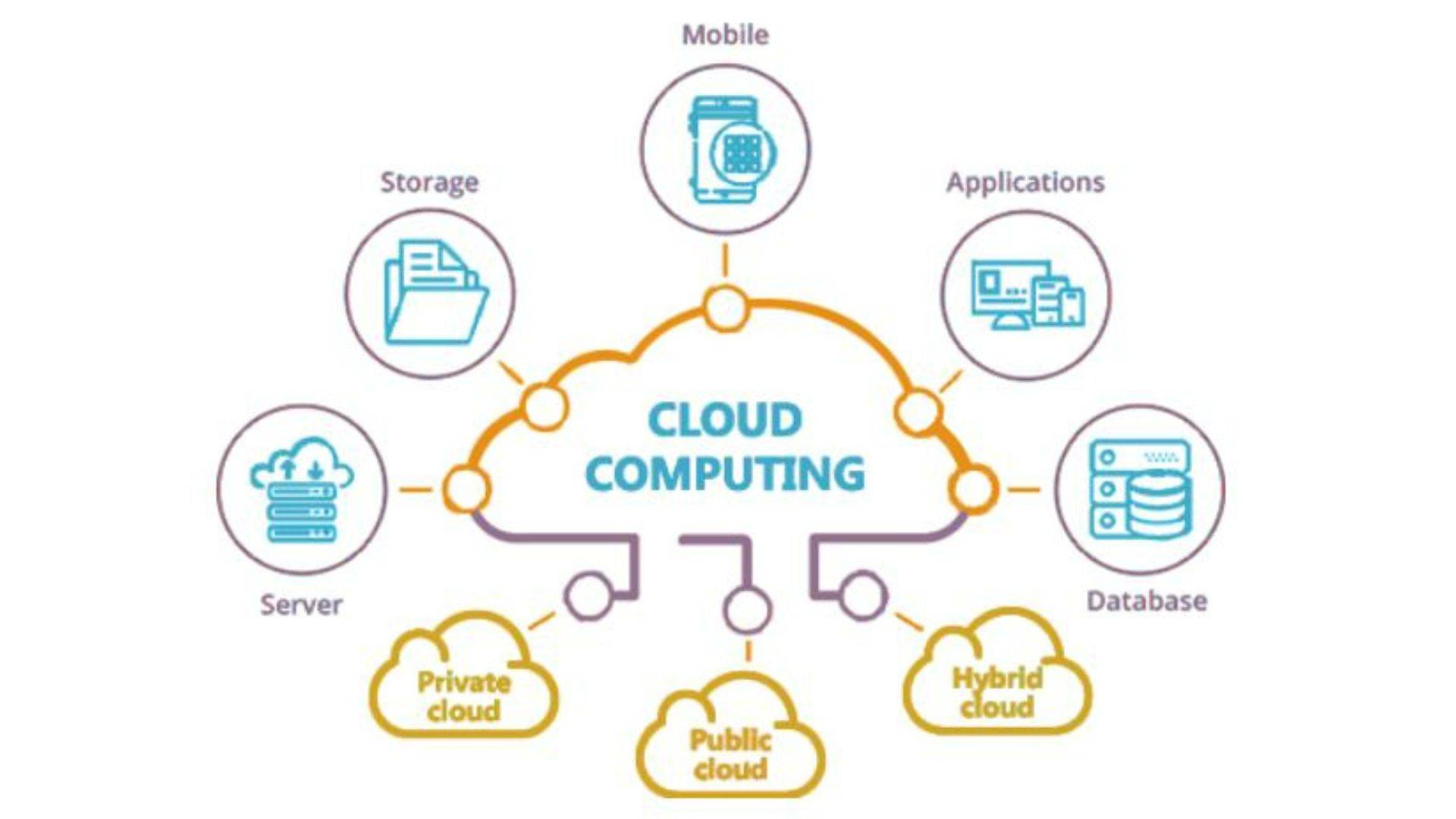Cloud computing refers to using a network of remote servers, typically hosted on the Internet, to store, manage, and process data rather than relying on a local server or personal computer. It involves delivering on-demand computing resources, including storage, processing power, and Software applications, over the Internet.
Cloud computing allows users to access their data, applications, and services remotely through a web browser or specialised client applications. The underlying infrastructure, including servers, storage, and networking equipment, is managed and maintained by cloud service providers.
The term “cloud” in cloud computing is a symbolic representation of the Internet. Cloud computing abstracts the complexity of infrastructure management and allows users to leverage powerful computing resources without the need for on-premises hardware or infrastructure. Users can scale their resources based on demand, pay for what they use, and access their data and applications from anywhere with an internet connection.
In summary, cloud computing is a model for delivering computing resources over the Internet, enabling users to access and utilise powerful computing capabilities without needing extensive on-premises infrastructure. It provides scalability, flexibility, cost savings, and other benefits to businesses and individuals alike.
Who Is Using Cloud Computing?
Various organisations and individuals across various industries use cloud computing. Here are some examples of entities that are using cloud computing:
Businesses
Small, medium, and large businesses of all industries are adopting cloud computing to streamline their operations, reduce costs, and enhance their agility. They leverage cloud services for data storage, application hosting, collaboration tools, customer relationship management (CRM), enterprise resource planning (ERP), data analytics, and more.
Startups And Entrepreneurial Ventures
Cloud computing provides startups and entrepreneurial ventures a cost-effective and scalable infrastructure to launch their products and services. It enables them to focus on their core business offerings without significant upfront investments in hardware or infrastructure.
Government Organizations
Government agencies and organisations use cloud computing to modernise their IT infrastructure, improve citizen services, and enhance data security. Cloud services help them manage large volumes of data, facilitate interagency collaboration, and deliver services more efficiently.
Educational Institutions
Schools, colleges, and universities leverage cloud computing for online learning platforms, collaboration tools, student information systems, and research initiatives. Cloud services enable seamless access to educational resources and provide a scalable and flexible infrastructure to support growing technology demands.
Nonprofit Organizations
Nonprofit organisations utilise cloud computing to streamline their operations, manage donor databases, and collaborate with distributed teams. Cloud services help them reduce costs, improve efficiency, and focus more resources on their mission-driven activities.
Healthcare Providers
Healthcare organisations adopt cloud computing to store and manage electronic health records (EHRs), facilitate telemedicine services, securely share medical images and data, and leverage data analytics for research and population health management.
E-Commerce And Online Services
Online retailers and e-commerce platforms rely on cloud computing to host their websites, manage inventory, process transactions securely, and scale their infrastructure during peak shopping seasons. Cloud services also power various online services, such as streaming platforms, social media networks, and on-demand video and music services.
Developers And Software Companies
Cloud computing offers development platforms, such as Platform as a Service (PaaS), which enable developers to build, test, and deploy applications quickly and efficiently. Software companies leverage cloud services to deliver their applications as Software as a Service (SaaS), eliminating the need for customers to install and maintain Software locally.
What Are The Benefits Of Cloud Computing
Cloud computing offers several benefits to organisations and individuals. Here are some key advantages:
Scalability
Cloud computing allows flexible scaling of computing resources based on demand. Organisations can quickly scale up or down their infrastructure, storage, and processing capabilities, ensuring they have the resources they need when they need them. This scalability eliminates the need for upfront investment in hardware and accommodates business growth or fluctuations in resource requirements.
Cost Savings
Cloud computing can significantly reduce IT costs. Instead of investing in and maintaining physical servers, networking equipment, and data centres, organisations can leverage cloud services on a pay-as-you-go model. They can avoid upfront capital expenses and instead pay for the resources they consume. Additionally, cloud services handle the maintenance and updates, reducing the need for dedicated IT staff and associated costs.
Accessibility And Flexibility
Cloud computing allows users to access their data, applications, and services from anywhere with an internet connection. This flexibility enables remote work, facilitates collaboration among distributed teams, and enhances productivity. Users can access cloud services from various devices, including laptops, tablets, and smartphones, providing seamless and consistent access to resources.
Reliability And Redundancy
Cloud service providers typically have a robust infrastructure with multiple data centers and redundant systems. This redundancy ensures high availability and minimises the risk of data loss or service disruption. If one server or data center experiences an issue, services can fail over to other locations, ensuring business continuity and minimizing downtime.
Security
Cloud service providers employ advanced security measures to protect customer data. They implement encryption, access controls, and regular security audits to safeguard data from unauthorized access or breaches. Cloud providers often have dedicated security teams and compliance certifications, ensuring industry-specific security requirements are met. Cloud services also provide data backup and disaster recovery capabilities, reducing the risk of data loss.
Automatic Updates And Maintenance
Cloud service providers handle infrastructure maintenance, software updates, and security patches. This frees organizations from the responsibility of manually managing and updating their systems, allowing them to focus on core business activities. Automatic updates ensure users can access the latest features, security enhancements, and performance optimizations. If you need any then visit our website AWS Training in Chandigarh.





